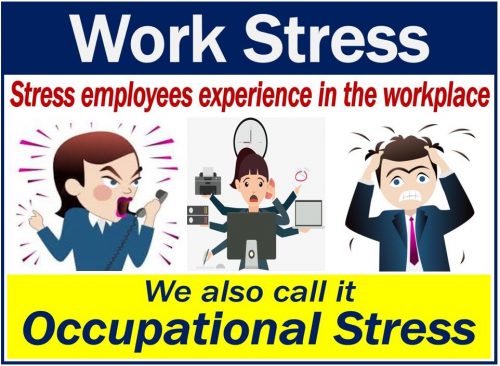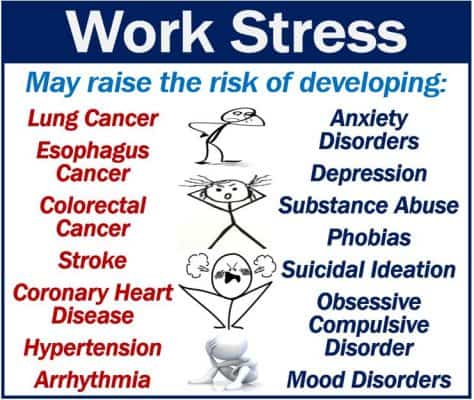Work stress is stress related to a worker’s job, i.e., stress people have in the workplace. It is often triggered by unexpected responsibilities. Employees have to deal with pressures that do not align with their skills, knowledge, and expectations. Their ability to cope subsequently suffers.
We can also use the term ‘occupational stress‘ or ‘work-related stress’ with the same meaning as ‘work stress.’
When workers feel that they are not getting enough support, work stress can get worse. Having little or no control over work processes may also intensify the effects of this type of stress.
Managing work stress is important
MIND, a British mental health charity, says that good stress management is crucial in the workplace. People who frequently experience feelings of stress at work might be at risk of mental health problems. Depression, for example, is a mental health problem that some employees have. Anxiety is also a mental health problem that is common in the workplace.
According to MIND:
“If you often experience feelings of stress, you might be at risk of developing a mental health problem, like depression or anxiety, and stress can also make existing problems worse.”
“Building resilience can help you to adapt to challenging circumstances.”

Work stress – origins
Below are some sources of occupational stress:
- Negative workload.
- A working environment that is toxic.
- Harassment.
- Bullying by colleagues, managers, supervisors, or directors.
- Difficult relationships with colleagues and/or administrators.
- Career development obstacles or barriers.
- Role ambiguity and role conflict.
- Number of working hours.
- Financial pressures.
Work stress and physical illness
There is a link between occupational stress and a greater risk of developing some diseases.
Occupational stress – cancer
A team of researchers in China found that stress in the workplace can increase the risk of developing some cancers.
They examined data on 280,000 men and women in North America and Europe. Work stress raises the risk of developing colorectal, esophagus, and lung cancers, they found.
They found no link, however, between occupational stress and prostate, ovarian, and breast cancer risk.

Occupational stress – cardiovascular disease
In 2015, two researchers at University College London gathered and analyzed data on 600,000 adult males and females from 27 cohort studies in Japan, the USA, and Europe. They found that work stress and long working hours were associated with a moderately high risk of incident coronary heart disease and stroke.
In the journal Current Cardiology Reports, they wrote:
“This review of evidence from over 600,000 men and women from 27 cohort studies in Europe, the USA and Japan suggests that work stressors, such as job strain and long working hours, are associated with a moderately elevated risk of incident coronary heart disease and stroke.”
“The excess risk for exposed individuals is 10-40 % compared with those free of such stressors.”
Remote work and stress
Many of us imagine that remote work is stress-free and a ticket to freedom and independence. However, this is not necessarily true for many people.
Management researchers say that people who are ideal for remote work are those with high emotional autonomy and stability. In other words, people who manage work stress well.
A team of researchers from Baylor University tried to identify what type of people were ideal for working from home. Remote work means working away from the office. Working at home, for example, is the main type of remote work.
Study leader, Prof. Sara Perry, had the following advice for managers who are selecting people for remote work:
“I would suggest managers look at employee behaviors, rather than for personality traits, per se. For example, if someone does not handle stress well in the office, they are not likely to handle it well at home either.”
“If someone gets overwhelmed easily or reacts in big ways to requests or issues in the office, they are likely less well positioned to work remotely and handle that responsibility and stress.”
It appears, therefore, that knowing how to manage work stress matters more than where you work. If you have good stress management skills, you will fare well not only in the office but also at home.
